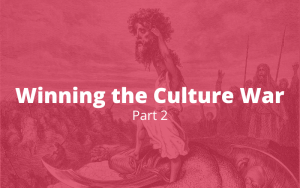What are the three targets we should aim at during childhood that will go into adulthood? What are the loves that last?
- Hard work over happiness
- Truth over technology
- Discipline over disorder
1) Hard work over happiness
Flowers do not grow out of powdered sugar but they grow out of mud and slime. Struggle during childhood makes for sturdy adults. Education is really just learning to love what is worth loving and at CDA. We view education as formation where students develop a Christ-centered foundation through memorization, narration, and good habits.
The way that we build a student culture of loving hard work at our Academy is really simple. The kids imitate the adults because education is caught more than it is taught. Kids ignore much of what we say but they catch what we do and imitate us. Monkey see monkey do, right? Students that love history generally caught their teacher’s enthusiasm as they retell the story of the battle of Thermopylae. Students learn to love Math through doing the repetitions and growing in problem solving. Students develop a love for reading through watching their dad read the Chronicles of Narnia with different voices for Mr Beaver and Aslan and Lucy. I learned to love hard work through adults making me do hard things. I never really thought about it consciously.
With our love what lasts theme, the world love is not sentimental or romantic but entails a common commitment, affection, and loyalty. Nothing is more contagious than sacrificial Christian love. This is why we say love what lasts rather than prioritize what lasts or focus on what lasts or pay attention to what lasts. Love is central because our hearts are central and education is formation. The impact of education will only last if the kids hearts are in it. That’s why we use the word love. An ounce of heart knowledge is worth a ton of head learning.
Proverbs 22:6 teaches the lasting influence of habitual hard work — “Start children off on the way they should go, and even when they are old they will not turn from it.” Our job is to lay a strong foundation, impart good habits, and point them in the right direction. Many parents find that by the 4th or 5th grade, the Latin, history, math and other subjects exceed their ability to help. However, parents still remain actively involved to ensure they are diligently working to prevent frustration from poor study habits. While some families may find it difficult to trade-off some recreational or entertainment time to focus on academics, our past CDA graduates commonly thank us for their training. When kids do not excel in speech meet or writing a paper or learning Latin, it’s okay. It’s a normal struggle that you should budget for in the overall formation process. On rare occasions, some misunderstand our work ethic. We do not desire or expect children to work excessively. Certainly, children need time to play and we place limits on what is appropriate for homework by age. This requires an ongoing conversation between parents and our Academy.
2) Truth over technology
Some times, we need to build a fence around what we love in order to protect it and keep out that which is dangerous. We need to limit the screens and phones and videogames that don’t last so we can maximize our attention on the truth, goodness, and beauty that do last. Scripture says, “The grass withers, the flowers fade, but the word of the Lord lasts forever.” You could also say, the screen fades, the battery dies, but truth lasts forever.
The research on kids and technology is clear. In the #1 New York Times Bestseller, The Anxious Generation, author Jonathan Haidt describes the decline of play-based childhood and the rise of phone-based childhood. He identifies four fundamental harms of phone based childhood: digital addiction, social deprivation, sleep deprivation, and attention fragmentation. The normalization of phone-based childhood can be reversed through cooperative efforts by parents at schools like Coram Deo. At Coram Deo Academy, kids are not permitted to have their phone out on campus— with the decline of screens, you see the rise of deep interaction with great ideas and meaningful conversation. The Washington Post cited a recent study that found, “the more children use computers at school, the more their reading abilities seem to suffer.”
Imagine that you bought your kid a drone for Christmas, and they flew it into the pond and it sank down to the deepest part of a pond in your neighborhood. You’d think, “I just bought you that and now you ruined it.” That’s basically what you’re doing if you invest in classical Christian education for your kids and then allowed unlimited screen usage and video games. Not only are you dramatically increasing the likelihood of exposure to objectionable content and strangers not safe for your children, you’re increasing their likelihood for depression, anxiety and self harm. If you’ve caved already, draw it back. It’s not too late. It is cooperation among parents that makes CCE work to its highest effect.
I’m not trying to be fun the police but I’m instead advocating for homes that are marked by peace, face to face relationships, and places of rest. Another great opportunity is to use mealtimes as times to discuss the kids’ lives from a Scriptural perspective. Time tested truths around the table will have a lasting impact well beyond childhood. We do our best in the Seibel household to not be dependent upon tvs and phones. Certain measures of technology are fine as long as its not taking the place of time tested truths. While technology often slaves, the truth sets students free to become responsible adults.
3) Discipline over disorder
At CDA, we realize that we discipline the ones that we love and discipline seems painful in the moment but it is pleasant in the long run. And by discipline, I mean more than providing consequences. Discipline refers to upholding behavioral standards and providing direction and correction. Kids that cannot delay gratification struggle as adults so structure childhood such that they develop internal discipline to stand on their own two feet. We know this is working when the kids develop a distaste for chaos and disorder. All children are prone to misbehavior on occasion, so we don’t expect your kids to be perfect (or even close). We do expect parents to support our teachers and administration as we lovingly yet firmly discipline children who are acting out. One of the best ways to create an environment conducive to learning is preserving joyful order — a tight ship full of grace.
This may sound like duh so let me name three pretty common errors that parents can fall into: the feelings trap, the rumination trap, the worry trap, and the dad trap.
- Feelings trap — Feelings are a gift from the Lord. They make great consultants but poor CEOs. The feelings trap is when parents pay too close of attention to their kids’ feelings during a struggle. This almost always results in snow plow parenting where you remove all obstacles for your kids and don’t let them struggle academically, socially, or spiritually. To spread a love for what lasts, we must say that emotions are unstable sometimes and cannot differentiate between reality and fantasy. They don’t always give accurate signals. Feelings fool us regularly. Help your kids navigate their feelings by remaining neutral, connnected, and asking questions.
- The rumination trap – sometimes there is a real place for biblical lament and grieving something sorrowful. Losing in Gaga ball is probably not that place. Rumination is where you continuously bathe in negative thoughts with kids thinking that you’re comforting them. To spread a love for what lasts, we must say that venting may produce ST relief but rehashing the same hurt can become pathological. Often times, kids need to be reminded that they’re capable, responsible, and resilient rather than victims of trauma in need of healing. Talking regularly about your emotional pain is itself a symptom of depression and rumination often makes the matters worse for kids.
- The worry trap — this is when you always affirm kids worries and never express any moral judgements about their worries. If a kid is treating a dog like a mountain lion, that’s irrational. If you affirm them in that as a child, they’ll be scared the rest of their lives. To spread a love for what lasts, we must teach them to pet a dog and to overcome the various fears that they have. Otherwise, those fears will be permanent sidekicks with them in adulthood.
This only gets more challenging as the kids enter into Logic and Rhetoric school. Imagine a dad that basically has experienced a lot of success parenting his daughter using ‘nip it in the bud’ type father-daughter interactions. But as dad has gotten promoted over the years, he travels more and distance has developed between him and his teenage daughter. Now ‘nip it in the bud’ parenting might not actually be the right form of discipline. He may need to have the discipline to adjust his own schedule to spend more time with his daughter as she is becoming a woman.
A love for discipline, truth, and hard work in our parent community WILL spread to our kids. These things are contagious and if the adults are doing well, the kids will be doing well. We are already doing well in these things and should keep stirring one another to spread a love for these things that last. Some of you feel like the stage that you’re in will never end but just remember, this too will pass. Nothing lasts except our influence on our kids into adulthood. How we live as the adults in the room is contagious to our kids.
We do all of this at Coram Deo for one reason — only one life twill soon be past, only what’s done for Christ will last. Before we die and our kids die, which they will, let’s prepare them to live a life worthy of their heavenly calling. Classical education helps them ask the right big picture questions and Christian education provides them with the right answers. I can think of no greater joy than being in Christ’s presence one day and seeing my kids and your kids and rejoicing over the work that He has done. We have meaningful work to do now. Let’s do it according to his grace and before his face. Let’s spread a love for what lasts to our kids.





